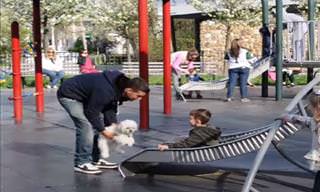



 2:36
2:36
Here's How You Tell Real Honey From Fake, Honey!
Wondering if the honey you are using is genuine or adulterated? These tips will help you identify the real stuff.
 7:02
7:02
Relieve Stress With These DIY Slime Stress Balls
Stress balls are great for relaxing your nerves when you are anxious about something. Here's to make one at home.

9 Ingenious Q-Tip Hacks for Surprising Daily Uses
We bet you never thought cotton swabs could be so handy around the house!
 3:55
3:55
If You Use Tomatoes, Then You MUST Know These Tips
Love using tomatoes? Then follow some of these tricks to make sure you use them right always.

12 New Things You Can Learn For Free From YouTube
Looking to learn something new? Learn some useful new skills with YouTube.
 3:15
3:15
Cleaning Tips: The Best Ways to Save Your Burnt Pot
Cleaning a scorched pot without scrubbing is possible! Here are some tips to make it look as good as new with ease.

Why You Shouldn’t Keep a Bar Soap for More Than 2 Years
The following 10 personal hygiene products all expire sooner than you’d think and you must replace them regularly

The BEST Drinks to Replenish Your Body After A Workout
What you consume to refuel your body after a workout really matters. The good news is, you really don't have to stick to plain water...

8 Ways You're Cooking Chicken Wrong
What's the best way to cook chicken? Get the best flavor out of your chicken by avoiding these 8 common mistakes.
 11:42
11:42
The Ultimate Summer Life Hacks Explained
Dive into these essential hacks to elevate your summer experience!

9 Ways to Care for Your Feet So They Don't Pain You
What's the best way to go about taking care of your feet? Here are 9 essential tips.

12 Fruit and Vegetables That are Dangerous to Consume
Which fruit and vegetables have the most pesticides on them? Find out here!

10 Best Plants to Plant During the Month of October
Here are ten of the best plants to get in the ground this October.
 3:40
3:40
Shocking! You Must Watch This Video About Child Safety
This social experiment reveals a shocking fact about child safety in parks. You definitely need to watch this!

7 Fantastic Alternatives to Traditional Gardening Methods
Check out some lesser-known yet effective gardening methods that will help you optimize space and grow more food.

NEVER Put These 5 Things in the Microwave!
Some things should never go in the microwave, because of the health dangers. Here are 5 things you should keep out of the microwave.

Want to Buy the Freshest Products? Here’s how!
There are basic food products that we consume regularly, so its super important to know how to check their quality. These next tips will help you do just that.

10 Financial Tips That Every Millionaire Has Long Known
Economically successful people don't rely on luck or fate. Heed these 9 tips to get on your way to achieving economic security.
 16:47
16:47
These Gentle Dog Breeds Are Perfect for Older Adults
Here are 10 dog breeds that are ideal for seniors.
 20:21
20:21
I Wish I'd Known About These Great Life Hacks Sooner
Whether you want to make your own musical instruments or learn how to take your clay modeling skills to the next level, this video has it all!

Home Guide: How to Stretch Your Carpet
Whether addressing slack areas in aging carpet or laying fresh carpeting, we've outlined carpet stretching methods that deliver professional-quality results at home.
 2:41
2:41
Stop Overpaying! Make Your Own Wiper Fluid On a Budget
Tired of pricey wiper fluid? Learn to make your own, safely.

Look At the Eyes: How to Tell When People Are Lying
According to NLP, one can know whether a person is lying or not only through the eyes. Learn how to do this with the help of this guide ...

How to Remove Candle Wax From Any Surface
Stubborn wax drips on clothes, carpets, and wood that can seem like a cleaning nightmare—but they don't have to be.

Experts Advise to Leave These Words Out of Your Vocabulary
Some very common words we say automatically might be making us look bad, experts say. These are the 5 words you should leave out your next conversation.

This is Why Getting Distracted Can Be Good For You
People think that getting distracted is a bad thing, but recent studies have actually disproved this. Learn more here!

Incredibly Interesting Facts and Figures About the World
These facts and figures about the world are the most interesting you have ever read.

Here Are the 8 Biggest Oven Mistakes You Should Avoid
Stop making these mistakes if you want your oven to remain fully-functional for many years to come.
 3:25
3:25
Whoa! I Never Thought of Using My Potato Peeler for This
Did you know there are more uses for your potato peeler? Find out!

15 Reasons to Never Throw Away Used Corks Again!
There's no limit with what you can do with a simple collection of corks. Make your used corks useful again with these brilliant DIY ideas.
 4:34
4:34
7 Super Useful Embroidery Tips and Hacks
Get to know 6 tricks for creating beautiful embroidery designs on clothes—perfect for beginners, but also for those already familiar with the technique.

Quit Smoking with These 10 Unconventional Tips
Giving up smoking is difficult, but not impossible - especially if you use these 10 unconventional tips.

Low-Sodium Cooking Tricks Everyone Should Know
These tips can help you reduce sodium in foods without having to cut down on flavor.

How to Maintain Great Skin at Every Decade of Life
From your 20s to your 70s, each decade requires different skincare strategies.

Decanting 101: Tips to Simplify and Organize Your Space
Read on to discover how decanting can help you organize your living space.

Fold Your Clothes the Right Way with This Guide
Have you been folding your clothes wrong all this time? These top 10 tips will help keep your clothes organized.

9 Dangerous House Smells You Should Never Ignore
If something smells off to you, there is probably a good reason. These are 9 potentially dangerous house odors you should never ignore.

Practical Guide: 15 Useful and Effective Tips for Home DIY
The tips covered here span a wide range of projects you're likely to encounter—from painting and wallpapering to fixing squeaky floors and tackling basic plumbing issues.

Reading Lessons from Einstein and 5 Other Famous Figures
Reading was one of the reasons why these 6 historical figures are recognized to this day. Here's what they can teach you about becoming a better reader yourself!

These Pickpocket Tricks Should Be Known by Everyone!
Pickpockets love to use these tricks in order to steal from unsuspecting victims. Here's what to keep an eye out for.

How to Treat and Prevent Deep Blackheads At Home
Blackheads are one of the most common — and most stubborn — skin concerns. In this article we will teach you how to treat and prevent them from the comfort of your own home.

How To Keep Your Bread Fresher For That Much Longer...
if you're wondering how to make your bread last longer, read the following article and learn about 5 different methods of doing just that!

8 Of the DIRTIEST Household Items and How to Clean Them
Even in the cleanest of homes, germs might be lurking in the most surprising everyday items. These are 8 items you should look out for and clean regularly.

16 Simple Paper Craft Tutorials You Can Make Right Now!
Feeling creative? The 16 paper craft tutorials are detailed and easy to follow, so get out your scissors and give them a go!

No More Clutter: Garage Organization Made Easy
15 smart ways how you can turn your garage into the most well-organized area in your home
 5:59
5:59
Animal Advice: How to Make Any Cat Like You
How to charm any cat you meet into liking you.
 18:57
18:57
A Better Kitchen: 20 Tips You Can't Afford to Miss
How to make your kitchen one of the EASIER rooms in the house? Just check out these 20 tips that'll make your kitchen a much nicer place
To enable your Ad-Free Subscription, please fill the fields below
Your subscription was successful, now you can enjoy an ad-free experience!! Note: To make sure you get no ads, please make sure to log in to your account. If you are logged in already, then refresh the page. The subscription can be cancelled at any time.


